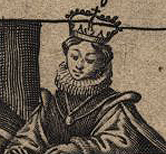Related Research Articles

Afonso I, also called Afonso Henriques, nicknamed the Conqueror and the Founder by the Portuguese, was the first king of Portugal. He achieved the independence of the County of Portugal, establishing a new kingdom and doubling its area with the Reconquista, an objective that he pursued until his death.

Constanza Manuel of Villena, was a Castilian noblewoman who by her two marriages was Queen consort of Castile and León and Infanta of Portugal.

Alcácer do Sal is a municipality in Portugal, located in Setúbal District. The population in 2011 was 13,046, in an area of 1,499.87 km2.

Fernão Lopes was a Portuguese chronicler appointed by King Edward of Portugal. Fernão Lopes wrote the history of Portugal, but only a part of his work remained.
Madragana Bat Aloandro, later Maior or Mór Afonso, was a woman from the Algarve known as a mistress to king Afonso III of Portugal, in the 13th century, when he ended the Reconquista in Portugal by taking Faro in 1249. Faro was at that time the last part of the Kingdom of the Algarve still in Muslim hands, and there her father was the Qadi.

Beatrice of Castile or Beatriz was an infanta of Castile, daughter of Sancho IV and María de Molina. She was Queen of Portugal from the accession of her husband, Afonso IV, in 1325 until his death on 28 May 1357.

Sabgal–Anicolor is a Portuguese UCI Continental status professional cycling team based in Vila Nova de Gaia.
Lua Vermelha is a Portuguese teen television series about vampires that aired on SIC. Produced in partnership with SP TV, Lua Vermelha premiered on January 31, 2010, airing on the weekends at 9:00 p.m. The series finale aired on May 27, 2012.

The Castle of Moreira de Rei is a well-preserved medieval castle located in the civil parish of Moreira de Rei, in the municipality of Trancoso, Portuguese district of Guarda.

The Castle of Folgosinho, is a medieval castle in the civil parish of Folgosinho, municipality of the Gouveia in the district of Guarda in the Centre region of Portugal.
The 2014 Prémio Autores was the fifth edition of the Prémio Autores. It took place on 8 May 2014 at the Salão Nobre dos Paços do Concelho of the Câmara Municipal of Lisbon, Portugal.

The Castle of Castelo Melhor is a medieval castle located in the civil parish of Castelo Melhor, in the municipality of Vila Nova de Foz Côa, Portuguese Guarda. The castle is one of the best examples of secondary medieval fortresses, erected in one of the more peripheral zones of the peninsular kingdoms.
João Afonso Telo,, mayor of Lisbon in 1372, admiral of Portugal from 1375 – 1376, and sixth Count of Barcelos, was a member of the highest ranks of the nobility, member of the Téllez de Meneses lineage as a descendant of Tello Pérez de Meneses.

Duarte Galvão was a Portuguese courtier, diplomat and chronicler.
Members of Parliament in the 2024 Portuguese legislative election will be elected in a closed list proportional representation system. Each constituency in Portugal elects a certain number of MPs depending on their number of registered voters. This number ranges from a minimum of 2 MPs in Portalegre to 48 in Lisbon. In this page, the names of the head candidates by party and/or coalition for each constituency will be listed. The leader of each party/coalition is displayed in bold.

Lisbon is one of the 22 multi-member constituencies of the Assembly of the Republic, the national legislature of Portugal. The constituency was established in 1976 when the Assembly of the Republic was established by the constitution following the restoration of democracy. It is conterminous with the district of Lisbon. The constituency currently elects 48 of the 230 members of the Assembly of the Republic using the closed party-list proportional representation electoral system. At the 2024 legislative election it had 1,915,287 registered electors.
References
- ↑ This is the English title used in Afonso 2018 and Villegas-Aristizábal 2019.
- 1 2 3 4 Amado 2010.
- ↑ Alfonso-Pinto 1999, p. 4.
- 1 2 3 4 Vasconcelos e Sousa 2007, pp. 2–3.
- ↑ Vasconcelos e Sousa 2007.
- ↑ Vilares Cepeda 1995, p. 77.
- ↑ Alves Moreira 2010, pp. 16–20.
- ↑ Alves Moreira 2010, pp. 27–28.